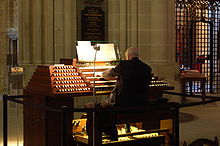- Organist
-
An organist is a musician who plays any type of organ. An organist may play solo organ works, play with an ensemble or orchestra, or accompany one or more singers or instrumental soloists. In addition, an organist may accompany congregational hymn-singing and play liturgical music.
Contents
Classical and church organists
The majority of organists, amateur and professional, are principally involved in church music. The pipe organ still plays a large part in the leading of traditional western Christian worship, with roles including the accompaniment of hymns, choral anthems and other parts of the worship. The degree to which the organ is involved varies depending on the church and denomination. It also may depend on the standard of the organist. In more provincial settings, organists may be more accurately described as pianists obliged to play the organ for worship services; nevertheless, some churches are fortunate to have trained organists capable of more elaborate "voluntaries" (the solo music before, during and after the service) and improvisation. As most churches can afford to employ only one musician, the organist is usually also responsible for directing and rehearsing the choir(s). In the twentieth-century, many pipe organs were replaced by pipe-less electronic and digital organs, often as a low-cost alternative to rebuilding older pipe organs.
In the English cathedral tradition the organist is now generally called "Director of Music", although his or her function is mainly in the training and direction of music rather than actual playing; there will generally be one or more assistant or sub-organists who play for most services and some recitals. Sometimes the organist will be assisted by an organ scholar. The post of organist at most of the great cathedrals includes recital work and choral training. Musicians such as Malcolm Archer, John Scott and Barry Rose are accomplished organists as well as choral directors. Another function of an organist is often as teacher to future players. Few organists hold historically special positions such as Carol Williams who is the Civic Organist of San Diego, the last true Civic Organist position still active in this the USA.
Since the strengths and weaknesses of the organ are difficult to understand without a good deal of playing experience, most music composed for organ has been written by organists. Since the majority of pre-twentieth-century organs were installed in churches, classical organ literature was almost exclusively written for liturgical use.
Many composers, therefore, are equally known for their performance talents, some historical examples being Johann Sebastian Bach, Dieterich Buxtehude, Felix Mendelssohn, Franz Liszt, César Franck, Charles-Marie Widor, Louis Vierne, and Marcel Dupré. In Europe, the historical importance of churches as employers of musicians meant that many composers who now are very seldom remembered for their association with the organ were, nevertheless, engaged as professional organists: for example, Wolfgang Amadeus Mozart, Camille Saint-Saëns, and Edward Elgar.
For a list of organists, see List of organists.
Ancient titles still in current use
In English churches, chapels and cathedrals the Organist may also be known as Master of the Choristers, Choirmaster or Director of Music; however, there are some ancient titles still in current usage:
- Church of St. Mary Magdalene, Newark-on-Trent - Master of the Song School
- Magdalen College, Oxford - Organist and Informator Choristarum
- Southwell Minster - Rector Chori
- York Minster - Master of the Music
- Westminster Cathedral - Master of Music
- Chichester Cathedral - Organist & Master of the Choristers
Theater organists
The theater organ has a separate repertoire and playing style, and in its heyday (during the first third of the twentieth century) there were considerable numbers of organists employed. A few carry on the tradition today.
Organists in popular music
There are many organists employed in the production of popular and jazz music. In the United States most of them play the Hammond organ, and many are classically trained, often in piano rather than organ. In England and Japan, one of the most popular series of instruments is the Yamaha Electone; while Electones of recent decades are more properly characterized as digital synthesizers rather than as organs, the player interface, and the skills and coordination required to play, mean that it is effectively an organ in these respects.
Organizations
The Royal College of Organists (RCO) in the United Kingdom is the oldest institution of organ studies. From that sprang the American Guild of Organists (AGO), the Gesellschaft der Orgelfreunde e.V. (GdO) in Germany, and the Royal Canadian College of Organists (RCCO). All these institutions are oriented toward the organist involved in classical music rather than popular music. There is also the American Theatre Organ Society.
See also
Further reading
- Organ playing and teaching in the Encyclopedia of Music in Canada
External links
- American Guild of Organists (AGO) (US)
- American Theatre Organ Society (ATOS) (US)
- The Royal College of Organists (RCO) (UK)
- Royal Canadian College of Organists (Canada)
- Gesellschaft der Orgelfreunde (Germany)
- Professional Organists Webring
- Concert Organist website (UK)
- Incorporated Association of Organists in the UK
- Organists' Review The leading journal for organists with a worldwide readership
- Young Organists on You Tube - A playlist of organists under 20 years of age
- Civic Organist of San Diego
Categories:- Classical organists
- Organists
- Organ improvisers
- Keyboardists
- Occupations in music
Wikimedia Foundation. 2010.

